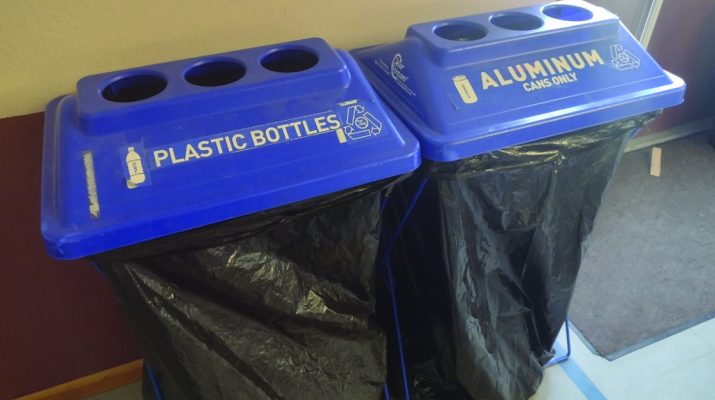Recycling has become part of the daily household routine for millions of Americans. Paper-based products, along with plastic, glass or metal containers find their way into bins separate from trash while waiting to be set out on the curb or take a ride in the family car to be recycled.
Outside of the home there are expectations for receptacles to deposit some, if not all, the same materials. Cities and towns often locate bins in public spaces while more and more businesses recycle. I like to discover options everywhere I go, from hotels and airports to zoos and national parks. Just having a choice even appeals to people who are not in the habit of extending the life of what could be recyclable.
On Mondays, while attending Cub Scout meetings with my son, I have noticed two blue recycling racks in the fellowship hall at the Evangelical Free Church. Though I seldom have anything from the evening’s activities to deposit, I was curious about the church’s “green” alternative for their congregation. I talked to Randy Waggener, who coordinates the recycling.
“Dick Ellis was instrumental in getting stuff set up in his retirement,” Randy said of how it started years ago. He and his wife Coleen coordinated everything and she continued after he died. “They were big on recycling.”
Currently, the church has two kitchen-style trashcans with flip top lids for bulletins and other paper – one just inside the doorway and the other in the hallway. The two racks collect aluminum cans and plastic, respectively. Randy explained the plastic that ends up in the bag has expanded from just pop and water bottles. People toss in a range of containers too – anything the symbol. The church also saves plastic grocery bags for reuse as trash can liners.
Recycling at E-Free is appreciated as an option, yet “Some people aren’t in the mode and put (everything) in the trash,” Randy said. “If you’re not in that mode you don’t think about it.”
The church does not produce a large volume though everything adds up. Randy empties the paper every 4-6 weeks (about a large grocery bag’s worth) and the other containers every 4-6 months.
Randy explained that the congregation has made other environmentally-based decisions. They recently moved from Styrofoam plates and cups to the paper equivalent that will decompose if not recycled. E-Free has been collecting batteries to recycle after rechargeable batteries no longer fit the bill.
As long as there is somebody to care for it, Randy wants recycling to be an option at church. “I think it goes back to if you’re there in that mode of recycling. Gives those people an option and they can practice the same thing they do at home.”
Randy said, “I’m a big recycler. We’ve done it quite a while. I don’t know when we started. Was when they (Keep Alliance Beautiful) did Nos. 1 and 2 plastic. We get rid of about everything.”
Recycling can be subtle. An in your face “How can you throw that all in the trash?!” approach turns people off. Take the initiative at church, work or wherever you spend time to make recycling available. People will appreciate the effort and likely help if asked. A few repurposed trash cans and an occasional trip to the recycling center make a difference.

